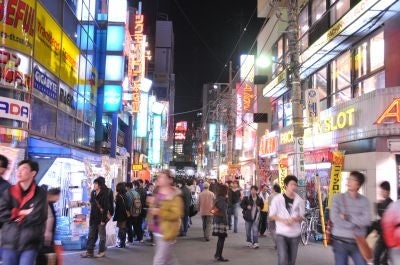Akihabara's popular "pedestrian paradise" to return

The Akihabara district of Tokyo is expected to reintroduce its "pedestrian paradise" scheme on Sundays and national holidays, two years after police and local authorities ordered it halted.
First introduced in 1973, it involved closing an 800-meter-long stretch of Chuo-dori, the main thoroughfare of the district, to traffic. Akihabara is famous around the world for stores that sell the latest electronic gadgets as well as shops that specialise in anime and manga items. Not only is Akihabara synonymous on an international level with technical gadgetry, it is one of the most popular places for foreign visitors to the Japanese capital, not least because many new products appear on the shelves of shops here before anywhere else.
The area is also known for its popular "maid cafes" - where customers are served by young women dressed as maids - while there has recently been an increase in the number of stores selling brand-name goods, particularly tapping into demand from foreign visitors.
The area's pedestrian scheme was hugely popular among local shop-owners, who made the most of the influx of visitors every weekend. Elsewhere, cafes set up tables and chairs on the roads, while musicians and street performers put on their acts.
All that changed on June 8, 2008, when Tomohito Kato, who was suffering from depression, went on a rampage through Akihabara, driving a light truck into crowds of shoppers and then stabbing people who tried to help the victims. Seven people were killed and a further 10 injured.
The police have been working with a local shop-owners' association and a city-planning committee to improve security in the area, installing more than 30 closed-circuit surveillance cameras and starting security patrols, as well as drawing up regulations on street performances and illegal shops.
A survey of local businesses earlier this year indicated that 70 percent of local people want the practise to be resurrected. Others, however, expressed concern due to fears over security, and the increase in noise and trash that is likely to be generated. The committee reached its decision after concluding that reintroducing the scheme will give a significant boost to the local economy.
The committee is to file a request with the Tokyo Public Safety Commission, which will have the final say on the matter, and hopes to be able to set July 18 as the first new "pedestrian paradise" day in the district.
JR
Join our commenting forum
Join thought-provoking conversations, follow other Independent readers and see their replies
Comments
Bookmark popover
Removed from bookmarks